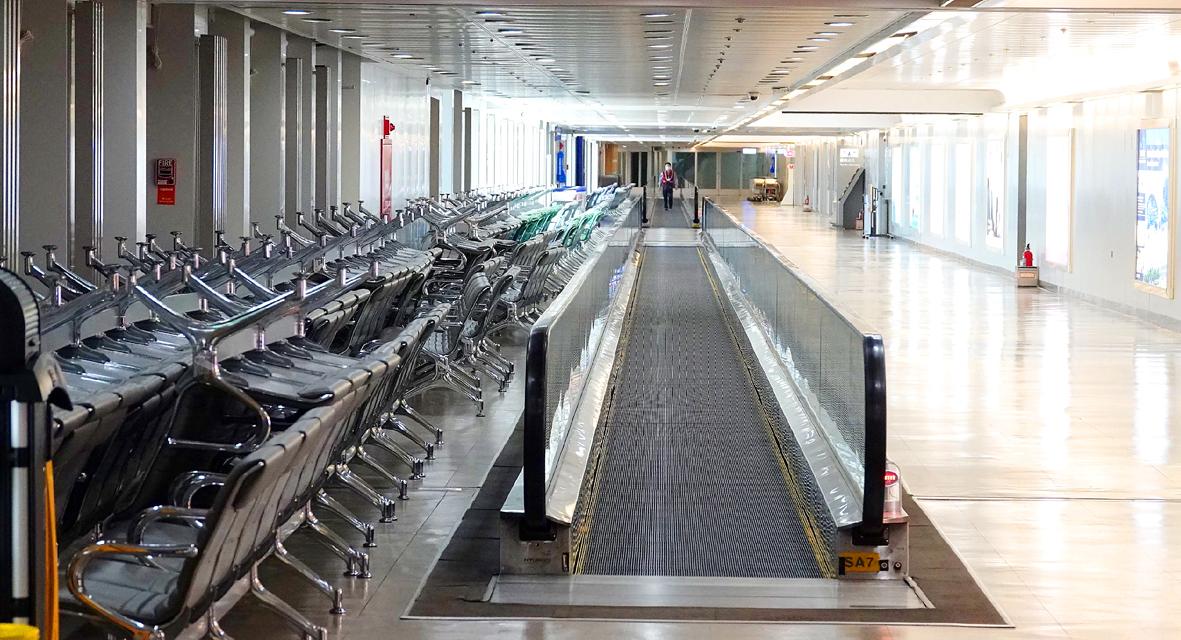Starting today, more than half of the boarding gates at the Taiwan Taoyuan International Airport are to be closed as the COVID-19 pandemic has led to a sharp decline in passenger traffic at the nation’s largest airport, Minister of Transportation and Communications Lin Chia-lung (林佳龍) said yesterday.
Lin spoke to reporters about the ministry’s decision after attending a ceremony in New Taipei City’s Tamsui District (淡水) to mark the launch of the construction of the Tamkang Bridge (淡江大橋).
“Passenger arrivals at the airport have dropped below 1,000 per day. We have been renovating some of the airport’s facilities and would start closing some boarding gates. Passengers would enter and depart through designated gates, which will allow us to save on personnel and maintenance costs,” Lin said.

Photo: Tony Yao, Taipei Times
Airport facilities that are under renovation include runways and taxiways, as well as restrooms, ceilings and floors inside the terminals, he said, adding that closing 20 of the 38 boarding gates would quicken the pace of renovations.
Asked why the ministry did not choose to close one terminal and leave the other one open, Lin said that shutting down one terminal would prevent airport employees from accessing facilities in the closed terminal.
Airport operator Taoyuan International Airport Corp (TIAC) said that it would close boarding gates A1 to A5 and B1 to B5 in Terminal One, and C6 to C10 and D6 to D10 in Terminal Two, adding that these gates are located at the far ends of the two terminals.
The remaining 18 gates would function normally, it said.
Not only would the measure meet the current demand, but it would also allow the airport company to more easily adjust usage of the boarding gates, it said, adding that it is a better cost-saving measure than shutting down one of the terminals.
Lin added that the ministry has approved TIAC’s proposed changes to the design of Terminal Three and submitted the proposal to the Executive Yuan for final approval.
If approved by the Cabinet, TIAC would be able to place the project on a public tender by the end of this year, Lin said.
The company has also adjusted the budget for the Terminal Three project from a more practical perspective, Lin said, adding that the exact amount is still being calculated.
The company has kept the design of a cloud-shaped ceiling for the terminal and eliminated some of the more complex details, which would make the terminal easier to build and maintain, Lin said.
It would be the fourth time that TIAC would be placing the project for tender, as the three attempts last year failed to attract any bidders, despite an increase in construction budget.
Under the new proposal, the budget allocated for the Terminal Three and other peripheral constructions would be about NT$95 billion (US$3.15 billion), of which NT$53.7 billion would be used to build the terminal.
Terminal Three would be opened in three stages, with the north concourse scheduled to be completed by 2024, the company said.
The main terminal is scheduled to begin trial operation in 2025, and the south concourse is to be completed by 2026, it said.

Taiwan has received more than US$70 million in royalties as of the end of last year from developing the F-16V jet as countries worldwide purchase or upgrade to this popular model, government and military officials said on Saturday. Taiwan funded the development of the F-16V jet and ended up the sole investor as other countries withdrew from the program. Now the F-16V is increasingly popular and countries must pay Taiwan a percentage in royalties when they purchase new F-16V aircraft or upgrade older F-16 models. The next five years are expected to be the peak for these royalties, with Taiwan potentially earning

STAY IN YOUR LANE: As the US and Israel attack Iran, the ministry has warned China not to overstep by including Taiwanese citizens in its evacuation orders The Ministry of Foreign Affairs (MOFA) yesterday rebuked a statement by China’s embassy in Israel that it would evacuate Taiwanese holders of Chinese travel documents from Israel amid the latter’s escalating conflict with Iran. Tensions have risen across the Middle East in the wake of US and Israeli airstrikes on Iran beginning Saturday. China subsequently issued an evacuation notice for its citizens. In a news release, the Chinese embassy in Israel said holders of “Taiwan compatriot permits (台胞證)” issued to Taiwanese nationals by Chinese authorities for travel to China — could register for evacuation to Egypt. In Taipei, the ministry yesterday said Taiwan

Taiwan is awaiting official notification from the US regarding the status of the Agreement on Reciprocal Trade (ART) after the US Supreme Court ruled US President Donald Trump's global tariffs unconstitutional. Speaking to reporters before a legislative hearing today, Premier Cho Jung-tai (卓榮泰) said that Taiwan's negotiation team remains focused on ensuring that the bilateral trade deal remains intact despite the legal challenge to Trump's tariff policy. "The US has pledged to notify its trade partners once the subsequent administrative and legal processes are finalized, and that certainly includes Taiwan," Cho said when asked about opposition parties’ doubts that the ART was

If China chose to invade Taiwan tomorrow, it would only have to sever three undersea fiber-optic cable clusters to cause a data blackout, Jason Hsu (許毓仁), a senior fellow at the Hudson Institute and former Chinese Nationalist Party (KMT) legislator, told a US security panel yesterday. In a Taiwan contingency, cable disruption would be one of the earliest preinvasion actions and the signal that escalation had begun, he said, adding that Taiwan’s current cable repair capabilities are insufficient. The US-China Economic and Security Review Commission (USCC) yesterday held a hearing on US-China Competition Under the Sea, with Hsu speaking on